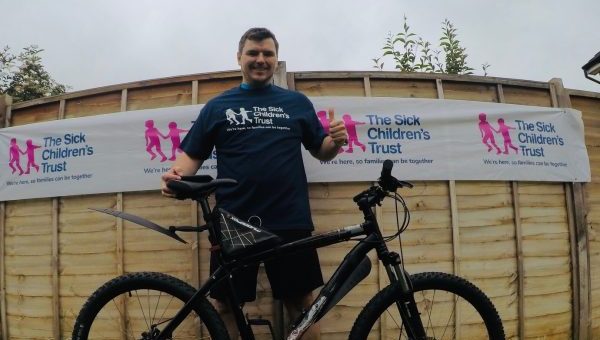I was rushed to Addenbrooke’s on the 13 April 2015 at 27 weeks pregnant because my waters were leaking. I was admitted on bed rest in the hope that I wouldn’t go into labour, however four days later I did, giving birth to my son Stanley, who weighed 2lb 1oz.
Stanley was taken from me immediately while the medical teams worked to stabilise him. He managed to breathe on his own for 12 minutes and my partner, Alan, got to meet our son before he was intubated and taken to neonatal intensive care (NICU). Two hours after I had given birth, I was taken to see him and this was the first time I got to touch him. I remember having to scrub my hand with alcohol gel before I put my hand on his head and we had our first family picture. I felt like it wasn’t real. I had no experience of premature babies, I had never been in this environment and I had never seen such a tiny person before. I was so scared and just wanted to be with my son, but I couldn’t, the best I could get was touching him briefly.

We knew that we were in for a long journey, Stanley was 12 and a half weeks early and the consultants told me to expect him to be in hospital until his actual ‘due’ date. We also knew that we would be in for a rough ride, things can change very quickly for a premature baby and Stanley couldn’t breathe or feed on his own.
Two days later I finally got to hold my son for the first time and we had our first experience of skin to skin contact. It was amazing, I got to cuddle my little boy and I could give him a kiss. He was so light I was so scared of hurting him but he was so settled. They say that premature babies do better with skin to skin contact and I truly believe that; it helped both of us.

Over the next three days I was still an inpatient and was only down the corridor from my son, I could go and see him anytime I wanted. I wanted to breast feed as I knew that breast milk would be best for Stanley; premature babies find it difficult to digest formula, so I used to sit with him while I was expressing. Being close to him whilst doing this was very important to help my milk come in; I needed to be near him. Eventually, after three days, it did and he was tube fed my breast milk. I continued to express sitting next to him every three hours whilst I was admitted, but I knew that I would be discharged soon. There were other people who needed my bed. I was worried and anxious as we lived over an hour away and I didn’t want to be that far away from Stanley, I couldn’t leave him.
The nurses told me about Chestnut House, run by the charity The Sick Children’s Trust and we found out there was a room available. I was over the moon. We would be well looked after and comfortable and now only minutes away from our son!
“Chestnut House is literally a ‘Home from Home’; somewhere quiet and comfortable to escape to. The machines in NICU are beeping all day long and sometimes you just needed to get away and to have space away from the wards. It was quiet and secluded and more like being at home. There were breast pumps available to use and a fridge to keep expressed milk in, which was so important to me. You could have your own comforts, being able to cook your own food, watch TV, just be ‘normal’ in such a strange situation – I don’t know what we would have done without it.”
There are other people’s stories all over the wall which gives you a sense of hope, seeing what other people have been through and the positive outcomes. You have to stay hopeful when you have a baby in NICU, but it can be quite isolating. It was so comforting to be with people going through similar experiences to you. Unless someone else has been through it, they don’t understand what it’s like.

The best thing was if I woke up in the middle of the night and wanted to see Stanley, I could just go upstairs and he was there. I was never far away from my baby boy. If we had people visiting we could just bring them into the house, the communal lounge was big enough for us to sit and have a chat to try to bring a bit of normality to our lives in the midst of the chaos.
“One day Alan decided to take me home for a couple of hours, just to get out for a bit. I lasted ten minutes before demanding that he take me back to the hospital. I just couldn’t be that far from Stanley. This just proves how vital Chestnut House was to us, it kept me close to my son.”
After three weeks, Stanley was transferred to Broomfield Hospital and we left Chestnut House. We were very lucky, we had no major setbacks, he never got an infection and he never needed surgery. Obviously we had blood transfusions, and became familiar with medical terms like constant desaturation, apnoea and tachycardia as he dealt with them, but it could have been much worse. When Stanley was in Broomfield Hospital, a nurse said she believed one of the reasons he had done so well was because I was there with him so much. This wouldn’t have been easy for me to do if it wasn’t for Chestnut House.
Stanley was discharged from Broomfield after nine weeks in hospital. He would have been 36 weeks gestation, so this just shows how well he did. He will be two this spring and he is a happy, healthy little boy. He has now been discharged from consultant care with regards to his prematurity and he is hitting all the milestones for his age. He is cheeky and inquisitive and very stubborn. Not only a trait from me, but I believe a result of his prematurity; he has had to fight from the start and I think he always will. He’s my little miracle and he makes me proud every day.

I’m so grateful for everything The Sick Children’s Trust, the Rosie Hospital, Broomfield and all our family and friends have done for the three of us, and everything they continue to do. We are a very lucky little family.
Su Barker and Alan Elvin,
Stanley’s Mum and Dad


